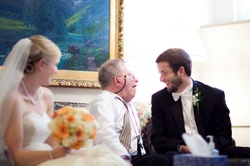William, as usual, stood on his tiptoes to turn the light on
at the bottom of the stairs. He then reached up again to turn it off.
“William,” I said, in my warning voice. “You can turn it off one time but then
it needs to stay off.”
He nodded. “Waste energy.”
It’s an incessant desire of his, to flip the switch and
watch the light go on and off, or the fan, or the water in the bathtub or the
sink. We talk about it all the time: “We don’t want to waste energy. We don’t
want to waste water.”
But sometimes I let him stand at the sink with his hands
under the water flowing from the faucet, and I watch his delight. And it
doesn’t seem like a waste.
I’ve written recently about our hopes to live a more simple
life, a life with less stuff, a life with less waste (see “Too Much Stuff” and
“What I’m Reading: Serve God, Serve the Planet“). And I mean it. But I want to
make sure that we retain that sense of wonder, that visceral appreciation for
beauty and delight. I think about the fact that we, somewhat routinely, spend
money on artwork. It serves no practical purpose. The money could be used to
feed children somewhere. And yet the paintings bring us joy and
remind us of grace.
It makes me think about a story from the Gospels:
While Jesus was in
Bethany in the home of a man known as Simon the Leper, a woman came to him with
an alabaster jar of very expensive perfume, which she poured on his head as he
was reclining at the table.
When the
disciples saw this, they were indignant. “Why this waste?” they
asked. “This perfume could have been sold at a high price and the money
given to the poor.”
Aware of this, Jesus
said to them, “Why are you bothering this woman? She has done a beautiful
thing to me. The poor you will always have with you, but you will not always
have me. When she poured this perfume on my body, she did it to prepare me for
burial. I tell you the truth, wherever this gospel is preached throughout the
world, what she has done will also be told, in memory of her. (Matthew 26:6-13)
Now I don’t mean to say that our artwork or William’s
delight in the kitchen sink are the same as Jesus’ preparation for burial. But
I think there’s a connection nevertheless. William is wasting water, I suppose,
when he stands at the sink. I’m wasting money when I buy Peter a painting for
his birthday. But perhaps there is a place for such waste. A declaration that joy
and beauty, as immeasurable as they might be, are nonetheless worthy of our time,
our money, our attention. A simple life with worthwhile wastefulness. That’s my
goal.

